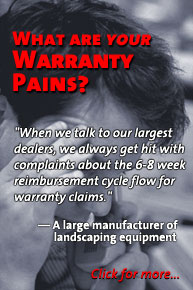May 27, 2003 |
ISSN 1550-9214 |
Spam Causes Gridlock on the Information Superhighway:Some mailboxes will be abandoned, others will be walled off from the outside world, impacting information delivery services.by Eric Arnum, Editor
Spam is killing email. To email users it's becoming a major annoyance, but to marketing companies, publishers, and other businesses that saw email as a revolutionary and efficient way to keep in touch with customers, spam is becoming a major threat.
The prohibition on graphics is a major threat to those who send out anything but plain text: monthly statements, newsletters, calendar listings, and product catalogs. Mail blocking is an even bigger threat, placing even the plain text mail traffic in jeopardy if is originates from a domain that made someone's blacklist. And it's not just the guilty that suffer. A week ago, Warranty Week had its messages to all America Online subscribers returned undelivered, because AOL wanted to make a point with our Internet service provider about certain subscribers it alleges are spammers. Email GridlockIronically, the editor of Warranty Week has now abandoned an AOL mailbox set up seven years ago as an emergency backup and traveling account. It has now become so overrun with spam that it no longer makes sense to even attempt to clean it out. We usually let AOL delete all unread messages after 28 days, but last week a handful of automobile extended warranty offers caught our attention. More on that later. Several Warranty Week subscribers have reported problems with their corporate mail systems stripping all graphics from the HTML Edition. In a few cases, the corporate mail filters block the entire newsletter, returning it to us as suspected spam because of all the links and graphics a typical edition contains. We simply convert the blocked subscriber to receive the Plain Text Edition, which includes all the words and some of the links to some of the charts embedded within the HTML Edition. But that won't work with the blocked AOL subscribers, because even those signed up for the Plain Text Edition are not receiving our email. Worse, they don't know what AOL is blocking on their behalf, and there is nothing they or we can do to unblock the weekly broadcasts. Every issue of Warranty Week is posted to the Web site at http://www.warrantyweek.com/newsarchive/ where it can be read or downloaded by anybody with Web access, with or without an email subscription. Readers who now receive an HTML newsletter containing no graphics, or those who for reasons of limited storage space would prefer a 40k plain text file to a 400k graphics file, are invited to switch to the Plain Text Edition simply by clicking here. The Message Is the MediumFor comparison's sake, tomorrow we will broadcast the Plain Text Edition of this week's newsletter to all HTML Edition subscribers. If you like what you see, or if it looks much the same as today's broadcast (because its graphics have been stripped away), then we encourage you to make the switch. However, the power of HTML newsletter publishing -- namely the ability to quickly direct a reader to numerous additional sources of information through the use of hyperlinks -- will be lost after the conversion to plain text. For that reason, we will include at the top of the page a link to the online Web Edition, which by its very nature is always filled with charts, photos, graphics, and hyperlinks. We do this knowing fully well how sensitive people are becoming to unsolicited commercial email -- a nice word for spam. Over the just-completed long weekend, Warranty Week shut off its email system for a few days. When it was restarted earlier today, there were 159 pieces of junk mail waiting in the spam folder. This is a nuisance, but it is manageable through the use of alias addresses, filters, topical folders, and other means. Basically, anyone who has ever sent a non-spam message to one of our mailboxes is on a "good guy" list, and their messages are sorted accordingly. Everyone else is guilty until proven innocent, and their messages are held in a special folder. During the business day the process of skimming through these messages every once in a while and deleting most of them is fast and routine, but as was the case this morning, sometimes the volume can overwhelm if the screening is not done often enough. Major email service providers such as AOL and Hotmail have recently announced that 70% to 80% of their incoming email traffic is now spam, which they now block. Others put the industry average closer to 50%, and say the spam volume for unpublished corporate email addresses is far less. Still, think for a moment how useful the telephone would become if half the calls were pornographic solicitations or if half of them were urgent appeals for money laundering assistance from the bogus sons and widows of dead African dictators. Granted, the use of voice mail can screen out those calls, but how many people would listen to 159 messages after a long weekend to see which ones were real? Spam Blocking SystemsOn April 30, America Online announced that it blocked 2.37 billion spams in a single day -- more than 70% of its inbound Internet email volume. That works out to 67 pieces of blocked spam per subscriber's mailbox per day, the company added. Or, put another way, it equals 1.6 million blocked messages per minute. Warranty Week has nine subscribers who use AOL email addresses. Last Monday, after broadcasting the weekly newsletter as usual, we promptly received nine non-delivery notices back from AOL, containing the following message: "The information presently available to AOL indicates that your server is being used to transmit unsolicited bulk e-mail to AOL. Based on AOL's Unsolicited Bulk E-mail policy at http://www.aol.com/info/bulkemail.html AOL cannot accept further e-mail transactions from your server or your domain. Please have your ISP/ASP contact AOL to resolve the issue at 703.265.4670." Warranty Week called the AOL phone number, and on the third try we got through to an actual human being. A service representative named Jason said that AOL has an "outstanding issue" with bulk mailings traced back to the rcn.net domain used by our Internet service provider, and that AOL began blocking messages from RCN's mail servers around ten days ago. He advised us to contact RCN to urge them to resolve the problem, although he conceded that little could be done over the long holiday weekend. To get through to our nine subscribers who don't know why they're no longer receiving Warranty Week, he advised us to use Microsoft's Hotmail service. Hotmail, meanwhile, now limits each Webmail account to no more than 100 messages sent per day, and no more than 2 Megabytes of received email (although users can pay for a higher mailbox limit). The service also now allows its customers to shut off all images within their email, to prevent the use of those nearly-invisible 1 x 1-pixel "images" that can be misused by a sender to track each opening of a message. Hotmail already aggressively filters all incoming messages for spam. But still the abuse continues, with the company reporting that it routinely blocks at least 2.4 billion messages per day -- 80% of the messages that attempt to reach its subscribers. Take It to CourtAOL and other ISPs have won lawsuits and collected damages from some of the biggest commercial spammers, and still it doesn't stop. Earlier in May, the Attorney General of New York indicted Howard Carmack, the so-called "Buffalo Spammer," for identity theft and fraud. The charges -- four felonies and two misdemeanors -- allege that Carmack stole the identities of at least two people and used them to open accounts on EarthLink, from which he sent around 825 million pieces of spam. The Federal Trade Commission said in an April 30 report that 33% of all spam messages recently analyzed by its Division of Marketing Practices contained false information in the From: field, and 22% contained false subject lines. Add to that the 40% of messages the FTC said contained some type of false information in the body of the message, but subtracting for overlap, and the study concluded that 66% of all spam contained false information in at least one of these three places. Previous FTC studies have concluded that 86% of all email addresses posted on a Web page end up on spam lists, and that 63% of all list removal requests are not honored. In fact, some say these removal requests are used merely as confirmations that a mailbox is active, and as a signal that its owner actually opens and reads his junk mail. The states of Washington and Virginia have outlawed unsolicited commercial email, and still it flows into their jurisdictions from out of state and across international borders. As a result, there are at least four attempts now under way to outlaw spam at the federal level, and one half-serious proposal to even pursue some kind of international anti-spam treaty at the United Nations. Spam PrisonsSenators Conrad Burns and Ron Wyden introduced a bill into Congress in April: the Controlling the Assault of Non-Solicited Pornography and Marketing Act of 2003 (also known as S.877, or by its acronym, the CAN-SPAM Act). Later in April, Senator Chuck Schumer held a press conference in New York at which he called for the creation of a "No-Spam Registry" where email users could opt out of commercial email deliveries. Spammers would have to check the list or face the penalties -- including prison time for repeat offenders. In May, Representative Zoë Lofgren and several colleagues introduced H.R. 1933, the Reduce SPAM Act of 2003. Also in May, Senator Bill Nelson introduced S.1052, the Ban on Deceptive Unsolicited Bulk Electronic Mail Act of 2003. Theoretically, if any of these bills becomes law, and spam becomes a thing of the past, Internet service providers and corporate email system operators could respond by removing some of their blocking software. However, some of these bills are rather weak, and others seem geared more for the cameras and the re-election campaigns of their respective supporters. So it's unlikely that spam-blockers will feel confident enough to drop their guard any time soon. What's In the Spam?Most spam is annoying, but some of it is as amusing as the little rectangular cans of luncheon meat that gave the stuff its name. Writers from Nigeria or the Ivory Coast ask the recipient for help smuggling millions of dollars out of the country. And by the way, can you photocopy your driver's license and give us your bank account number too? Others promise low mortgage rates, or miracle cures, or what we'll euphemistically call new friends eager to make your acquaintance. Last week, eight different messages sent to Warranty Week's mailboxes promised rate quotes for automobile extended warranties and service plans. Three of them took us to the same quotecarlog.com Web form through different intermediaries. A fourth brought us to a Web form at stauncher.biz, and the fifth brought us to a Web form at cwfreewarrantyquote.com. The last three unfortunately didn't work: the "click here" link within them tried to take us to a non-existent Web page. Perhaps those businesses were so fast-moving that their email outlasted their corporations? Anatomy of Eight SpamsAdvertising Auto Extended Warranty Rate QuotesMost of the data in the above chart is linked to the actual Web pages involved in the spamming. If you click on anything in the middle column, you'll need quick eyes to see the referral URL before you're taken to the landing page listed in the corresponding right-hand column. In the case of the bottom three rows, however, the links are to the domain name registration pages of the alleged spammers, because it seems their Web sites have been shut down. If anything else disappears after today's newsletter is published, we'll change the link in the Web Edition to point to copies of these pages we saved just in case. Bogus Domain Name Registrations?Warranty Week obtained domain name registration pages for each of these solicitations, and contacted the registrants by phone and/or email. The goal was simply to find out who they were and what extended warranty company they were representing. It was not so easy. Several of the domains are registered to people named Smith. Others list no phone numbers, use post office boxes as addresses, and list Webmail accounts as contact addresses. Some of the records contain what we suspect are deliberate errors, such as spelling the John in John Smith as j-u-h-n, or listing Los Angeles as a city in the U.S. Virgin Islands. In other words, these domain registrations probably are not going to be renewed, so it's no problem if their owners can't be contacted. The fnithbn.com and fiuws.com domains are registered to a Mr. W. P. of Kuala Lumpur, Malaysia. One knowledgeable insider suggested this may be an alias for a Mr. John Common, whose Warranty USA operation was pursued into bankruptcy by at least three state Attorneys General towards the end of 2001. But he was last seen in Seattle and Las Vegas, so it's hard to fathom why he'd set up shop so far from home. A Mr. Justin Thompson runs the areuntoit.com domain from a post office box in Tempe, Arizona. He did not respond to emails and did not list a phone number. The freecorporate.biz domain is registered to a Mr. Mark Winters of Los Angeles, U.S. Virgin Islands. He listed a 13-digit phone number and a Yahoo email address for contact information. The phone number didn't work and he did not respond to emails. All In the FamilyA Mr. John Smith of London, England registered imonetary.biz and mychanger.biz, while a Mr. Greg Smith of Dayton, Ohio registered goinghere.biz and stayforquote.biz. Interestingly, both men use the same Webmail service in Italy; neither responded to messages sent there; and neither seems to have a working phone. Meanwhile, a Mr. Fredric Smith of Amherst, Massachusetts runs the xinterests.biz domain used to originate one of the spam emails as well as the "free warranty quote" Web form on the quotecarlog.com site, which was the ultimate destination of three of the spams. There was one and only one response to more than a dozen inquiries, and it came from a Mr. William McIntyre Sr. of Malibu, California, owner and operator of the cwfreewarrantyquote.com and the continentalwarranty.com Web sites. MCG Enterprises Inc. is the formal corporate name of the company doing business as Continental Warranty. Another "dba" the company has used is MCG Marketing, a now-dormant direct marketing company that lists Toyota Motor Credit Corp. as a past client. Warranty Week first tried to contact McIntyre by email, but his mailbox was over quota and was not accepting additional messages. However, his voice mail was working, and after a few hours he returned our call. "I get tons of email," he explained by phone last week. "I hadn't been on my computer in a while, and I just was on, and I had several hundred messages," he said, most of which were spam. Welcome to the club. McIntyre could not provide any help tracking down the spammers advertising his company's auto extended warranty offerings. "We don't send out email at all," he said, although he admitted he sometimes sends out messages to people already in his database by virtue of their past business dealings with him. McIntyre also said he's rented lists in the past, and has used direct mail companies to distribute both postal and email solicitations. But he said he does not know a Jean Williams or the company that uses the fourdt.com domain. "I don't know who sent you the email. That's all I can tell you. I've never heard of that person." Spam-Blocking BlacklistsInterestingly, the mcgmarketing.com domain, MCG Enterprises, and Bill McIntyre each made the spam blacklist at Rhyolite Software. "This list is published to suggest that people with legitimate mail to send from these domains to rhyolite.com make other arrangements for that mail," the company writes. "The objectionable quality of the mail is often but not always that it is unsolicited bulk email or spam." Meanwhile, the r.fourdt.com domain made the Master Ban List at Sean Tomlinson's samizdata.org site. We did not find either continentalwarranty.com or cwfreewarrantyquote.com on anybody's blacklist, but that's no surprise if these domains are always used as a destination rather than as a source. The cwfreewarrantyquote.com Web site is just a landing page for prospects, McIntyre explained. People actually do complete the Web form posted there, giving their full name and address and both their home and work phone numbers, in hopes of receiving a free rate quote for an extended warranty. "We have people that drive them there, and then they fill out the information," he said. It's all very routine. To him, there is nothing unusual at all about the whole process, even though the name and address of his company and its insurance backers are nowhere to be found in either the email solicitation or in the rate quote Web form. "People have been selling warranties over the Internet for years. I don't understand what's so unique or different about what we're trying to find out," he said. The extended warranty company needs to know where you live and what you drive in order to furnish you with a rate quote. "There are numerous sites that ask you to put up whatever information they require to get a quote for a warranty. I think that method has been around as long as I've been in the warranty business." Privacy Concerns
We're sometimes tempted to reply to some of the sons of African dictators and oil tycoons who promise millions of dollars for our money-laundering assistance, and once in a while we dream about claiming our travel rewards or entering the sweepstakes for that big screen TV. But spam is a problem that now demands a solution, and any encouragement of these folks is probably counterproductive. Just so you know, since the inbox was emptied earlier this morning, 26 more pieces of spam arrived... | ||||||||||||||||||||||||||||||||||||||||||||||||||||||||||||
| ||||||||||||||||||||||||||||||||||||||||||||||||||||||||||||


 Internet service providers, tired of seeing their mail servers buckle under the increased load, are now walling themselves off from the spammers, blocking off whole sections of the Internet because of the actions of a few. Meanwhile, to combat pornographic spam and to guard against viruses, some companies are blocking all messages that contain images or scripts of any kind.
Internet service providers, tired of seeing their mail servers buckle under the increased load, are now walling themselves off from the spammers, blocking off whole sections of the Internet because of the actions of a few. Meanwhile, to combat pornographic spam and to guard against viruses, some companies are blocking all messages that contain images or scripts of any kind.
 Warranty Week did not complete any of the Web forms promising a free rate quote, but perhaps some of our more adventurous readers might want to do so and let us know the results. Our email addresses have obviously been bought and sold so many times that it makes no sense to overtly link them with accurate phone numbers or postal addresses.
Warranty Week did not complete any of the Web forms promising a free rate quote, but perhaps some of our more adventurous readers might want to do so and let us know the results. Our email addresses have obviously been bought and sold so many times that it makes no sense to overtly link them with accurate phone numbers or postal addresses.



